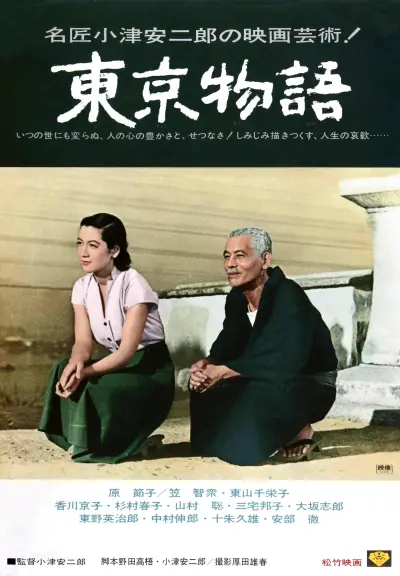
Ah, "Tokyo Story"! Now there's a timeless classic from Japan that continues to touch the hearts of audiences around the world. It's not just any old family drama, but a poignant exploration of generational divides, the transient nature of life, and the ever-changing fabric of post-war Japanese society. Released in 1953, this masterpiece by legendary director Yasujirō Ozu is both delicate and powerful in its simplicity.
The magic of "Tokyo Story" lies in its straightforward story. It centers around an elderly couple, Shukichi and Tomi Hirayama, who embark on a journey from their quiet seaside hometown to the bustling metropolis of Tokyo to visit their grown children. However, what should be a warm family reunion turns out to be a series of polite indifference and subtle disappointments, as the hustle and bustle of modern life leave the children too busy to spend time with their parents. This all-too-relatable narrative reveals the solitude that often comes with aging and the heartache of feeling left behind.
Now, the scenario of "Tokyo Story" isn't about dramatic confrontations or shocking plot twists. Ozu's style is like a gentle breeze that subtly shifts the curtains. It's the small moments that tell the grand story: a missed train stop, a quiet conversation about life, an unexpected illness. The dialogue is minimal but loaded with unspoken sentiments. As the story unfolds, it's what's not said that tugs at the emotions. There's an acceptance by the parents of their children's self-absorption, depicted with a tenderness that avoids outright judgment.
The settings in "Tokyo Story" play a crucial role too. It's all told through Ozu's unique low-camera perspective, which captures the family drama amid the changing landscapes of post-war Japan. Tokyo is depicted as a place both fascinating and isolating, symbolizing progress that inevitably brings about disconnect within the traditional family structure. The elder Hirayamas' hometown represents the past, a slower, more communal way of life that's slipping away as Japan rushes towards modernity.
Thematically, Ozu masterfully addresses the bitter ironies of familial relationships and the bittersweet reality of parental sacrifice. The elderly couple spent their years nurturing their family, only to be politely marginalized when they're perceived as a burden. Yet, even within this seemingly bleak reality, there's a sense of resilience and quiet dignity that the Hirayamas maintain. The character of Noriko, their widowed daughter-in-law, stands out as the soul of empathy and kindness, embodying the film's ideals of love and selflessness amidst the impositions of life's relentless march.
"Tokyo Story" isn't just a film; it's a profound, contemplative experience that gently encourages viewers to reflect on their own lives and relationships. It's about recognizing the silent struggles within a family, understanding the inevitable human condition of growing old, and perhaps, serving as a reminder to cherish the brief, ephemeral moments we share with our loved ones. Even after all these years, Ozu's quiet opus resonates deeply and urges us to ponder the real cost of progress and the enduring strength of the human spirit.

